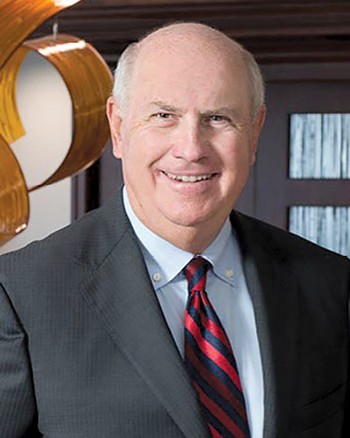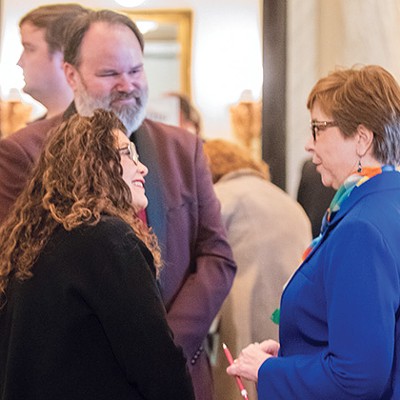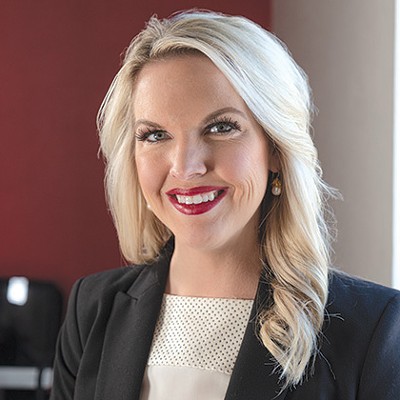
Sen. Julie Daniels, R-Bartlesville, and Rep. Mark Lepak, R-Claremore, have coauthored Senate Bill 361, which protects “any lawful verbal, written, audio-visual or electronic means by which individuals may communicate ideas to one another.” Both lawmakers were invited to the White House by President Donald Trump because of their work on the bill.
Many critics have asked why the bill is needed when the First Amendment already provides for freedom of speech. This should be the first reaction, Lepak said, since people expect the First Amendment to be fully observed, but in recent years, he feels universities have shifted away from that.
“I was at the White House [March 21], and in the room were probably, by my count, 140 college students from all over the U.S.,” he said. “Every one of them seemed to have a story regarding their problems with free speech on their campus. They’ve been disciplined. They’ve been prevented from doing something. If they started to do something, maybe it was shut down. … They actually thanked Sen. Julie Daniels and I for running the bill.”
Though Lepak said this has not happened in Oklahoma to the same extent as in other states, he wants to prevent it from happening altogether. In fact, Lepak said it might be even more important now that Trump signed an executive order requiring colleges to protect free speech or risk losing federal research funding.
“Trump has issued his executive order, which basically says, ‘You allow free speech on campuses or there’ll be consequences because I have some authority to withhold funding through the grant process in research dollars,’” Lepak said. “Well, that’s even more reason to pass this bill because then it provides a framework in Oklahoma for which these universities can settle in under and comply with, and then you can turn around to the Trump administration … and say, ‘Look. We did this in Oklahoma; we put this in place.’”
While Lepak said conservative views tend to be the ones more likely to be objected and regulated, he emphasized the bill is not “about left and right” ideologies.
“Other things that maybe are more left and left of center don’t get quite the regulatory hand, so I’ll acknowledge that,” he said. “But the way the bill is written is intended to be content-neutral about these kinds of things. So on the same day, in the same place, you could have students expressing one view and another set expressing the exact opposite. I think that’s part of a higher education and really what we ought to be expecting and teaching our children to expect in preparing them for life in this country.”
Speech not currently protected by the First Amendment would still be prohibited, Lepak said, but it is important to expose yourself to a variety of worldviews.
“All free speech really is my right and your right to express yourself in many different forms, but it isn’t your right to stop me from expressing myself or vice versa,” he said. “That’s a very careful balance there. The problem with free speech is also its greatest strength; you may not hear things or see things or observe things that you like, and you may be offended. … You kind of have to accept that risk in order to have a marketplace of ideas and exchange of ideas.”
Lepak said he understands that minority students might be more concerned about white supremacy or prejudiced language.
“I’m 62 now, and in my time, I think when you see extremes reveal themselves for who they really are, it really hurts their cause. What they’re looking for is the confrontation, but if you try to push it back, you end up giving them exactly what they want,” he said. “If you let them do their thing, you see how extreme they are. It stands alone, and in my view, it isolates them. Now, that doesn’t mean you don’t voice your opinion. … I think the line people don’t need to cross is the one where you’re provoked into doing something you shouldn’t do.”
Bill breakdown
The bill states that all outdoor areas of campus are deemed public forums and prohibits universities from creating “free speech zones.” The bill emphasizes that a person’s conduct must be lawful and states that universities retain the ability to enforce reasonable time, place and manner restrictions that are narrowly tailored.Bob Nelon, a Hall Estill attorney specializing in First Amendment law, said he would oppose the bill if he were a legislator. While he said campus “free speech zones” generally tend to restrict rather than promote free speech, he wonders if the bill is a solution in search of a problem.

“At first blush, SB361 would appear to prohibit a speech-restricting rule or practice and, thus, foster expressive speech,” he wrote in an email to Oklahoma Gazette. “If the use of such zones is pervasive and their use has resulted in restricting expressive speech, the bill may serve a useful purpose. On the other hand, if universities and colleges don’t often use ‘free speech zones’ or there is no documented and repeated experience where speech has been unduly limited, I wonder why the bill is needed.”
The bill requires universities to publicize policies, regulations and expectations in handbooks, websites and orientation programs and develop materials and procedures to make sure those in authority understand the policies. It also requires universities to submit an annual report to the state Legislature and governor “that details the course of action implemented to be in compliance” with these provisions as well as post the report on their websites.
Nelon wrote that these requirements are of “questionable value.”
The bill states that any person or student organization “aggrieved by a violation” of the provisions may sue the university and its employees responsible for the violation. If a court finds a violation took place, “it shall issue an award of at least” $5,000. However, the bill requires that people must bring a suit within “one year after the day the cause of action occurs” and each day a policy is in violation constitutes a new day.
“The wording of SB361 is complicated and may contain traps for the unwary or have unintended consequences,” Nelon wrote. “Moreover, the bill would create a new statutory cause of action and a somewhat unusual definition of the statute of limitations. At present, if someone’s expressive activity on campus is unconstitutionally hindered or restricted, remedies already exist. I’m not sure why this statute is necessary to protect speech interests that are already protected.”
Nelon also wonders if the bill was introduced in thinking the measure would allow conservative voices like Milo Yiannopolous to speak on campuses. The former Breitbart News editor was blocked from speaking at several universities in the past few years through student protests.
The bill passed in the state Senate 36-9. It now moves to the state House of Representatives and will be heard in the judiciary committee.
Visit oklegislature.gov to view the bill.











